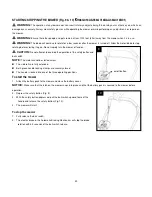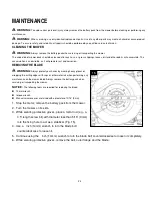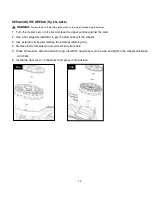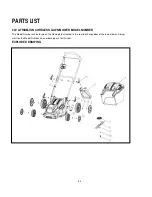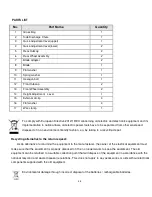
22
MOWER OVERLOAD PROTECTION
To prevent overload conditions, do not try to remove too much grass at one time. Slow down your cutting pace or raise the cut
height.
Your mower has built-in overload circuit protection. When the mower is overloaded, the motor will stop and the power indicator on
the mower will flash red. Remove the battery pack from the mower. Check to see if grass has collected beneath the deck and clear
it if necessary, then install the battery and restart the mower.
BATTERY HIGH TEMPERATURE PROTECTION
The battery pack will generate heat during operation. The heat dissipates more slowly in hot weather. If the battery temperature
exceeds 230°F (110°C) during operation, the protection circuit will immediately turn off the mower to protect the battery pack from
heat damage. The power indicator on the mower will shine orange and the LED on the battery will flash red.
Release the bail handle, wait until the battery pack cools down to approximately 194°F (90°C), then restart the mower.
MOWING TIPS
NOTICE:
A sharp blade will greatly enhance the performance of the mower, especially when cutting tall grass. Make sure to
check the sharpness of the blade before mowing.
1. Verify that the lawn is free of stones, sticks, wires, and other objects which could damage the lawn mower or motor. Such
objects could be accidentally thrown by the mower in any direction and could cause serious personal injury to the operator and
to others.
WARNING:
If you strike a foreign object, stop the motor and remove the battery. Thoroughly inspect the mower for any
damage, and repair the damage before restarting and operating the mower. Excessive vibration of the mower during operation is an
indication of damage. The unit should be promptly inspected and repaired.
◼
For best results, do not mow in circles. Travel back and forth across the lawn.
◼
When cutting thick grass, reduce your walking speed in order to allow for a more effective cut and a proper discharge of the
clippings.
◼
To maintain a healthy lawn, cut off only one-third or less of the total length of the grass. The average lawn should be
approximately 1-1/2 to 2 inches long during cool months, and between 2 to 3-1/4 inches long during hot months.
SLOPE GAUGE (Fig. 14)
WARNING:
Do not mow a slope that has an angle of greater than 15° (a rise of approximately 2 1/2’ (0.75m) every 10’ (3m)).
Mow across the face of a slope and never up and down.
Use Fig. 14 as a guide in order to identify slopes that cannot be mowed safety.
MULCHING TIPS
WARNING:
Inspect the area where the mower is to be used and remove all stones, sticks, wire and other debris that might
be thrown by the rotating blade.
◼
Release the switch to turn off the mower blade rotation when crossing any graveled areas; stones can be thrown by a rotating
blade.
◼
Set the mower to the highest cutting height when mowing on uneven ground or in tall growth.
◼
For effective mulching, do not cut wet grass; it tends to stick to the underside of the deck, preventing the proper mulching of
grass clippings. The best time to mow grass is in the late afternoon, when the grass is dry and the newly cut area will not be
exposed to direct sunlight.
◼
For the best mulching performance, set the cutting height to remove approximately one third of the grass blade length, ideally
no more than 1 1/2” at one time. If the grass is overgrown, it may be necessary to increase the cut height to make it easier
to
mow and to prevent overloading the motor. Slow your cutting pace in tall or thick grass conditions. For mulching extremely
thick or tall grass, it is advisable to first cut at a high cut-height setting, and then re-cut to the final cut height. Otherwise, make
narrower cuts and mow slowly. ALWAYS MAKE SURE THAT THE BLADE IS SHARP.













